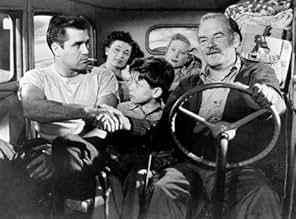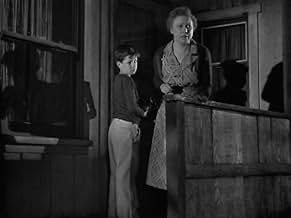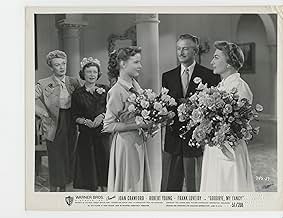Lurene Tuttle(1907-1986)
- Actress
Quite a familiar lady and notorious busybody on 1950s and '60s TV and
film, petite, red-headed character actress Lurene Tuttle was born in
Pleasant Lake, Indiana and raised on a ranch close to the Arizona border.
Her father, O.V. Tuttle, started out as a performer in minstrels, but found
a job as a railroad-station agent when times got hard. Her grandfather
was a drama teacher who once managed an opera house in Angola,
Indiana. As a child, she studied acting in Phoenix and was known for her
scene-stealing comedy antics even at that early age.
At age 15, the family relocated to Monrovia, California, and it was there that Tuttle began her career. She received dramatic training at the Pasadena Playhouse and appeared in many of their productions, including "The Playboy of the Western World." She subsequently became a troupe member of Murphy's Comedians, a vaudeville company, and then eventually extended her range as a dramatic ingénue in stock shows. Although making it to Broadway somehow slipped through her fingers, Tuttle worked on stage consistently throughout the 1920s and 1930s. Known for her speaking voice and mastery of a wide range of dialects, she found a new avenue in radio during the Depression and became one of that medium's most-recognized voices playing both sweet and sour characters. Dubbed the "First Lady of Radio," her best-remembered role came as Effie, the altruistic "Girl Friday" on "The Adventures of Sam Spade" opposite Howard Duff's cynical-edged gumshoe. Red Skelton also admired her versatility and used her frequently in a variety of parts on his radio show.
Film and TV presented itself to her strongly in the 1950s, by this time fitting in comfortably whether a warm and wise wife and mother or brittle matron. Following her film debut in Heaven Only Knows (1947), Tuttle lent able support alongside film's top stars including Cary Grant in Mr. Blandings Builds His Dream House (1948) and Room for One More (1952); Marilyn Monroe in Don't Bother to Knock (1952) and Niagara (1953); Joan Crawford in Goodbye, My Fancy (1951); Leslie Caron in The Glass Slipper (1955); and even Liberace when he tried to go legit in Sincerely Yours (1955). It was a rare occasion, however, when she was given a chance to truly shine in a prime supporting role. She could always be counted on to steal a bit of focus with just a sly grin or cynical look as she did playing the brief part of the sheriff's wife in Alfred Hitchcock's horror classic Tâm Thần Hoảng Loạn (1960). One of those rare exceptions when Tuttle actually top-lined a film came with her crazed portrayal of the title character in Ma Barker's Killer Brood (1960). Here Tuttle pulled out all the stops in this admittedly fictional "B" crimer, going totally ballistic as the Ozark matriarch who, along with her boys, sets people on fire, runs over cops, and tommyguns her way into infamy. On the small screen, Tuttle was an amusing regular in a plethora of sitcoms, playing starchy relatives or gossipy townsfolk. Most audiences remember her quite fondly as the matriarch in Life with Father (1953) opposite Leon Ames, and as the crusty senior nurse on the Diahann Carroll series Julia (1968). She and Ames took the play "Life With Father" on the road several times after the series' demise.
Off-stage, Tuttle was married to fellow actor and announcer Mel Ruick; their paths initially crossed while both were performing in radio. Their daughter was musical comedy actress Barbara Ruick, best known for playing Carrie Pipperidge in the classic film musical Carousel (1956). The couple eventually divorced, and Tuttle wed again, but the marriage was short-lived. Tragically, her only child, who was married to epic film composer John Williams of "Star Wars" fame, died unexpectedly in 1974.
Tuttle was a well-respected drama and diction coach for several decades. She began teaching radio technique in the 1940s and re-trained some prominent actors who were returning from extensive WWII duty. After a lengthy departure in the 1950s due to TV commitments, she returned to to teaching acting almost to the end. Some of her more famous students included Red Skelton, Orson Welles, Milton Berle, Steve Allen, and Jayne Meadows. She lived out the rest of her life in Southern California and succumbed to cancer at age 78. In addition to her famous son-in-law, she was survived by her three grandchildren: Jennifer Gruska, a story editor; Mark Towner Williams, a drummer; and Joseph Williams, a composer and singer.
At age 15, the family relocated to Monrovia, California, and it was there that Tuttle began her career. She received dramatic training at the Pasadena Playhouse and appeared in many of their productions, including "The Playboy of the Western World." She subsequently became a troupe member of Murphy's Comedians, a vaudeville company, and then eventually extended her range as a dramatic ingénue in stock shows. Although making it to Broadway somehow slipped through her fingers, Tuttle worked on stage consistently throughout the 1920s and 1930s. Known for her speaking voice and mastery of a wide range of dialects, she found a new avenue in radio during the Depression and became one of that medium's most-recognized voices playing both sweet and sour characters. Dubbed the "First Lady of Radio," her best-remembered role came as Effie, the altruistic "Girl Friday" on "The Adventures of Sam Spade" opposite Howard Duff's cynical-edged gumshoe. Red Skelton also admired her versatility and used her frequently in a variety of parts on his radio show.
Film and TV presented itself to her strongly in the 1950s, by this time fitting in comfortably whether a warm and wise wife and mother or brittle matron. Following her film debut in Heaven Only Knows (1947), Tuttle lent able support alongside film's top stars including Cary Grant in Mr. Blandings Builds His Dream House (1948) and Room for One More (1952); Marilyn Monroe in Don't Bother to Knock (1952) and Niagara (1953); Joan Crawford in Goodbye, My Fancy (1951); Leslie Caron in The Glass Slipper (1955); and even Liberace when he tried to go legit in Sincerely Yours (1955). It was a rare occasion, however, when she was given a chance to truly shine in a prime supporting role. She could always be counted on to steal a bit of focus with just a sly grin or cynical look as she did playing the brief part of the sheriff's wife in Alfred Hitchcock's horror classic Tâm Thần Hoảng Loạn (1960). One of those rare exceptions when Tuttle actually top-lined a film came with her crazed portrayal of the title character in Ma Barker's Killer Brood (1960). Here Tuttle pulled out all the stops in this admittedly fictional "B" crimer, going totally ballistic as the Ozark matriarch who, along with her boys, sets people on fire, runs over cops, and tommyguns her way into infamy. On the small screen, Tuttle was an amusing regular in a plethora of sitcoms, playing starchy relatives or gossipy townsfolk. Most audiences remember her quite fondly as the matriarch in Life with Father (1953) opposite Leon Ames, and as the crusty senior nurse on the Diahann Carroll series Julia (1968). She and Ames took the play "Life With Father" on the road several times after the series' demise.
Off-stage, Tuttle was married to fellow actor and announcer Mel Ruick; their paths initially crossed while both were performing in radio. Their daughter was musical comedy actress Barbara Ruick, best known for playing Carrie Pipperidge in the classic film musical Carousel (1956). The couple eventually divorced, and Tuttle wed again, but the marriage was short-lived. Tragically, her only child, who was married to epic film composer John Williams of "Star Wars" fame, died unexpectedly in 1974.
Tuttle was a well-respected drama and diction coach for several decades. She began teaching radio technique in the 1940s and re-trained some prominent actors who were returning from extensive WWII duty. After a lengthy departure in the 1950s due to TV commitments, she returned to to teaching acting almost to the end. Some of her more famous students included Red Skelton, Orson Welles, Milton Berle, Steve Allen, and Jayne Meadows. She lived out the rest of her life in Southern California and succumbed to cancer at age 78. In addition to her famous son-in-law, she was survived by her three grandchildren: Jennifer Gruska, a story editor; Mark Towner Williams, a drummer; and Joseph Williams, a composer and singer.





























